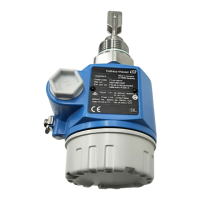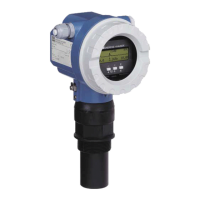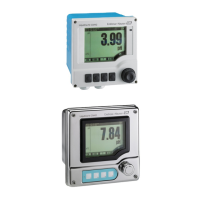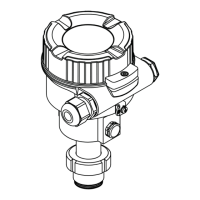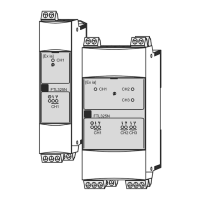Commissioning Solicap M FTI55, FTI56
60 Endress+Hauser
6.2.8 Configuring two-point control and buildup mode
!
Note!
• In the case of non-conductive bulk solids, vertically installed probes can also be used for two-point
control. The switchpoints of the empty and full calibration activate, for example, a handling
device. If you want to use the two-point control, please note the following:
– Set the necessary measuring range. For more information, see ä 54: "Setting the measuring
range".
– Perform empty and full calibration.
– Set the failsafe mode (MIN/MAX) in accordance with your requirements. For more
information, see ä 63.
• If you switch on the two-point control (s mode), the switch point adjustment (as described on
ä 59) is disabled. The switch points correspond to the calibration points.
• The "Buildup mode" ensures that a safe switch point is output even if the probe is not fully
released from the conductive medium (> 1000 μS/cm e.g. gypsum). Deposits or buildup on the
rod/rope are compensated for.
To configure the two-point control and/or buildup mode, proceed as follows:
1. Turn the function switch to position 4.
2. Press the "+" key for at least two seconds to switch on the two-point control. The green
LED 5 lights up.
3. Press the "+" key again for at least two seconds to switch on buildup mode. Green LEDs 4
and 5 light up.
– Pressing the "+" again for at least two seconds switches off both functions. Green LEDs 4
and 5 are off.
4. After you have configured the desired setting, turn the function switch to position 1 to return
to operation.
You have now completed the settings for the two-point control and buildup mode.
Function switch
position
Function – key + key Light emitting diodes (LED signals)
A B C 1 (green) 2 (green) 3 (red) 4 (green) 5 (green) 6 (yellow)
4
Two-point control s Press once On
buildup mode Press twice On On **
* These settings are factory settings.
** Switch status signaling (on/off/flashing) depends on the mounting location selected and the failsafe mode (MIN/MAX) set.
The LED flashes if a calibration has not yet been carried out.
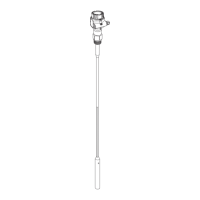
